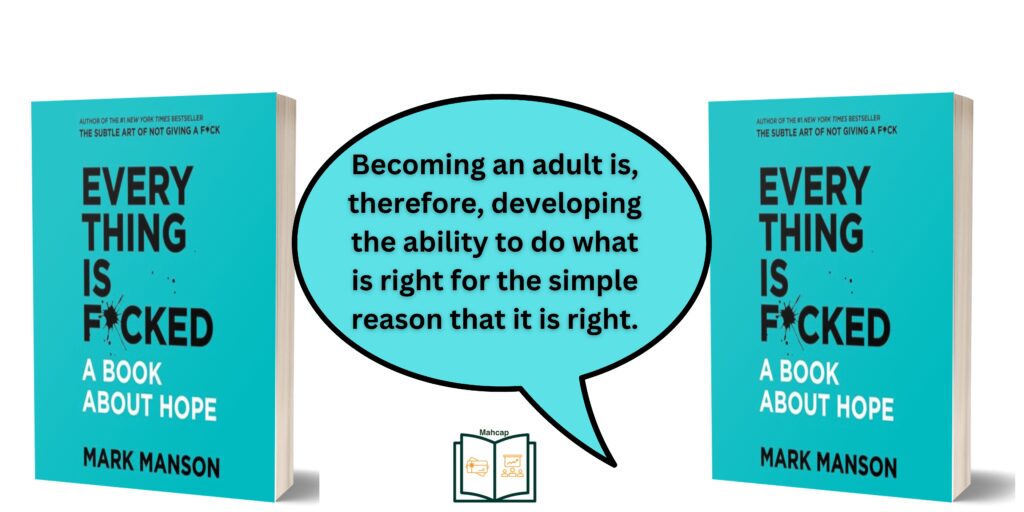EveryThing Is Fucked by Mark Manson
Mark Manson is a writer who teases your mind to think beyond the box and question certain convictions about life. He inspires readers to define and relearn their life experiences. This is my second time reading “Everything is Fucked,” by Mark Manson, and it will not be my last.
Lessons Learned
When I first read “EveryThing is Fucked,” a few years ago, I spent days thinking about what Mark Manson discussed and how it put my experiences into perspective. I learned valuable lessons worth sharing1.
The Paradox of Progress
The paradox of progress implies that the better things get technologically and economically, the more certain challenges persist. For instance, healthcare, transportation, communication, and the internet have continued progressing, providing us with the best services and opportunities. Today, our grandfathers and mothers complain about how things used to be worse when they were growing up and often emphasize how lucky we are to have the best of things now. However, one thing they continuously ignore is that the fact that things used to be worse when they were growing up does not make us feel better about our problems today.
Because today, drug usage is at its highest globally. An interaction with a researcher at the Youth Empowerment Authority highlighted that drug abuse is on the rise in Ghana, and surprisingly, more females, even those in universities studying societal “highly respected” courses, are into drugs. Also, depression and loneliness are on the rise globally, and many are unsatisfied with their lives. Climate change issues are getting worse.
Therefore, no matter the progress made, no generation will be spared life challenges because each generation finds purpose and hope in trying to solve those challenges.

How to Build and Maintain Hope
To build and maintain hope, we need three things.
- A sense of Control: we must feel as though we are in control of our own lives and that we can affect our fate. Without control, we feel powerless to pursue anything.
- A belief in the value of something: it means that we must find something important and work toward achieving it. Without values, nothing appears worth pursuing. You must identify a particular challenge worth solving.
- Community: without community, we feel isolated, and our values cease to mean anything. If you lose any of the three, you lose the other two. Lose any of the three, and you lose hope.
The Value of Human Emotions/Feelings
Many people blame their emotions often for their failures, inefficiencies, and problems and try to control their emotions or wish they could. However, the story of Eliot and frontal lobotomy patients says otherwise.
The Brain Surgery that Damaged Elliot’s Emotions (Feeling Brain)
Elliot underwent brain surgery for a tumour, which changed his life forever. After the surgery, Elliot starts to view everything as having the same value and, therefore, loses his ability to prioritize. He made poor choices like going to buy a stapler over joining the funders meeting or watching TV over sending his son to school. His productivity declined to zero, and he eventually lost his job and abandoned his family. Clearly, something was wrong with Elliot. But every psychological and cognitive test declared Elliot fine and normal. His IO was high, his reasoning solid, and his memory was great. It took a neuroscientist named Mr. Antonio Damasio to reveal that the tests measured Elliot’s ability to think, not his ability to feel or capacity for emotions. The surgery had made Elliot indifferent and unempathetic. Therefore, all activities bring him the same level of joy and satisfaction. Losing a million dollars for not attending funders’ meetings felt the same as watching TV. He had become a “walking, talking, indifference machine” who could not make value judgements and determine better from worse.
Antonio Egas Moniz Frontal Lobotomy Discovery
Frontal Lobotomy is a form of brain surgery procedure invented by Antonio Egas Moniz, a neurologist. He discovered in the 1940s that if people with extreme anxiety, depression, or other mental health issues had their brains maimed, they would become fine and cheerful. He even won a Nobel Peace Prize for his discovery.
However, by the 1950s, people noticed that lobotomy patients became zombies and extremely lazy. While the procedure cured them of their emotional afflictions, it also left them with an inability to focus, make decisions, make long-term plans or have careers.

The Twist in Elliot and Lobotomy Patients’ Condition
Questions: However, the key issue in this conundrum was that if Elliot was still as intelligent as ever, why did his productivity decline to zero, and he lost his job? If Lobotomy patients had no emotions, why did they become lazy and zombies?
Answer: This was because Elliot’s surgery affected his ability to feel and make value judgements. Also, feelings or emotions inspire action, and without feelings, lobotomy patients have no motivation to act or do anything.
Food for thought: The truth is that we have all had the experience of knowing what to do but failing to do it or postponing important tasks because of a lack of motivation/emotion. The classic assumption is that we believe we can become more efficient and productive if we can control our feelings/emotions. Yet, Elliot had no emotions or feelings but became inefficient and lost everything, thus questioning the logic of the classic assumption.
Emotional vs Cognitive Brain
Our brains consist of the feeling (emotional) brain and the thinking (cognitive) brain. Both carry out specific functions but are equally important and must work together to make us function well.
Thinking/Cognitive) Brain
Your thinking brain represents your conscious thoughts and your ability to make calculations, reason, and plan. It is rational, factual, and objective but slow, requires much energy, and can become fatigued. The thinking brain makes lateral connections between events and decides how things are. A person who denies the thinking brain becomes impulsive and selfish, warping reality to conform to his whims and fancies, which are never satiated. The problem is that nothing is ever enough for such people.
Feeling/Emotional Brain
The feeling brain represents your emotions, impulses, intuition, and instincts. It arrives at its conclusions quickly and effortlessly but is irrational, subjective, and relative. It makes hierarchical connections (better/worse, superior/inferior) and decides how things should be. A person who denies the feeling brain and emotions rejects the ability to make value judgments and becomes indifferent to life.

The Driver and the Navigator (feeling and thinking brain)
The feeling brain generates the emotions that cause us to move into action, and the thinking brain suggests where to direct that action. Emphasizes on “suggest.” Therefore, while the thinking brain cannot control the feeling brain, it can influence it. However, the feeling brain is stubborn, and if it wants to go in a particular direction, it will drive that way regardless of the facts and data the thinking brain provides.
Therefore, to maintain a sense of hope, the thinking brain, with time, starts to produce reasons to justify the actions of the feeling brain, regardless of whether they are right or wrong. This leads to self-serving bias, where we justify stupid and foolish actions with reasons.
Self-serving Bias and Narcissism
Self-serving bias makes us assume that our feelings are always right, making self-gratification the only reason for our life pursuits. Self-serving bias individuals are easily manipulated by whoever or whatever makes them feel good consistently.
Also, we all possess some degree of narcissism. We all overestimate our skills and intentions and underestimate the skills and intentions of others. When we screw up, we tend to believe it was some happy accident, but when someone else screws up, we immediately rush to judge them. Therefore, we must learn to be selfless sometimes, to free the world of greed and to focus on the good in people. Everyone is capable of good and bad things, and as we continuously seek the bad in people, we eventually see it based on the blue dot effects.
Conclusion
If you learned something new, got inspired or impacted by this post, share your insights with us via the comment box. Also, remember to subscribe to Mahcap for more relevant, educative, informative, and inspiring information.
By: Huzeima Mahamadu (Researcher and Storyteller).
References
- Manson, M., (2019). Everything is F* cked. HarperAudio. https://www.m-vg.de/mediafiles/Leseprobe/9783742311016.pdf ↩︎
